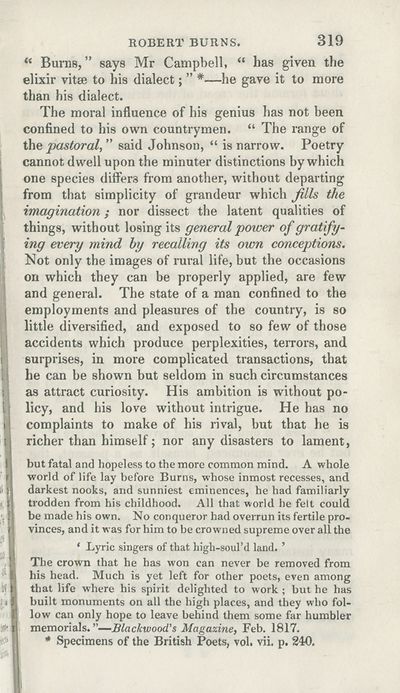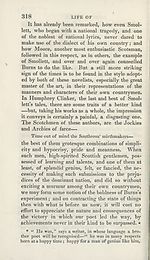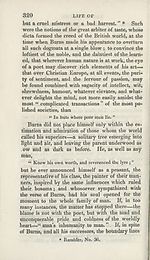Scotland/Scots > Life of Robert Burns
(329)
Download files
Complete book:
Individual page:
Thumbnail gallery: Grid view | List view

ROBERT BURNS. 319
“ Burns, ” says Mr Campbell, “ has given the
elixir vitse to his dialect; ” *—he gave it to more
than his dialect.
The moral influence of his genius has not been
confined to his own countrymen. “ The range of
the pastoral," said Johnson, “ is narrow. Poetry
cannot dwell upon the minuter distinctions by which
one species differs from another, without departing
from that simplicity of grandeur which /ills the
imagination; nor dissect the latent qualities of
things, without losing its general power of gratify¬
ing every mind by recalling its own conceptions.
Not only the images of rural life, but the occasions
on which they can be properly applied, are few
and general. The state of a man confined to the
employments and pleasures of the country, is so
little diversified, and exposed to so few of those
accidents which produce perplexities, terrors, and
surprises, in more complicated transactions, that
he can be shown but seldom in such circumstances
as attract curiosity. His ambition is without po¬
licy, and his love without intrigue. He has no
complaints to make of his rival, but that he is
richer than himself; nor any disasters to lament,
but fatal and hopeless to the more common mind. A whole
world of life lay before Burns, whose inmost recesses, and
darkest nooks, and sunniest eminences, he had familiarly
trodden from his childhood. All that world he felt could
be made his own. No conqueror had overrun its fertile pro¬
vinces, and it was for him to be crowned supreme over all the
‘ Lyric singers of that high-soul’d land. ’
The crown that he has won can never be removed from
his head. Much is yet left for other poets, even among
that life where his spirit delighted to work; but he has
built monuments on all the high places, and they who fol¬
low can only hope to leave behind them some far humbler
memorials. ”—Blackwood’s Magazine, Feb. 1817.
* Specimens of the British Poets, vol. vii. p. 240.
“ Burns, ” says Mr Campbell, “ has given the
elixir vitse to his dialect; ” *—he gave it to more
than his dialect.
The moral influence of his genius has not been
confined to his own countrymen. “ The range of
the pastoral," said Johnson, “ is narrow. Poetry
cannot dwell upon the minuter distinctions by which
one species differs from another, without departing
from that simplicity of grandeur which /ills the
imagination; nor dissect the latent qualities of
things, without losing its general power of gratify¬
ing every mind by recalling its own conceptions.
Not only the images of rural life, but the occasions
on which they can be properly applied, are few
and general. The state of a man confined to the
employments and pleasures of the country, is so
little diversified, and exposed to so few of those
accidents which produce perplexities, terrors, and
surprises, in more complicated transactions, that
he can be shown but seldom in such circumstances
as attract curiosity. His ambition is without po¬
licy, and his love without intrigue. He has no
complaints to make of his rival, but that he is
richer than himself; nor any disasters to lament,
but fatal and hopeless to the more common mind. A whole
world of life lay before Burns, whose inmost recesses, and
darkest nooks, and sunniest eminences, he had familiarly
trodden from his childhood. All that world he felt could
be made his own. No conqueror had overrun its fertile pro¬
vinces, and it was for him to be crowned supreme over all the
‘ Lyric singers of that high-soul’d land. ’
The crown that he has won can never be removed from
his head. Much is yet left for other poets, even among
that life where his spirit delighted to work; but he has
built monuments on all the high places, and they who fol¬
low can only hope to leave behind them some far humbler
memorials. ”—Blackwood’s Magazine, Feb. 1817.
* Specimens of the British Poets, vol. vii. p. 240.
Set display mode to:
![]() Universal Viewer |
Universal Viewer | ![]() Mirador |
Large image | Transcription
Mirador |
Large image | Transcription
| Antiquarian books of Scotland > Scotland/Scots > Life of Robert Burns > (329) |
|---|
| Permanent URL | https://digital.nls.uk/108249807 |
|---|
| Description | Thousands of printed books from the Antiquarian Books of Scotland collection which dates from 1641 to the 1980s. The collection consists of 14,800 books which were published in Scotland or have a Scottish connection, e.g. through the author, printer or owner. Subjects covered include sport, education, diseases, adventure, occupations, Jacobites, politics and religion. Among the 29 languages represented are English, Gaelic, Italian, French, Russian and Swedish. |
|---|

